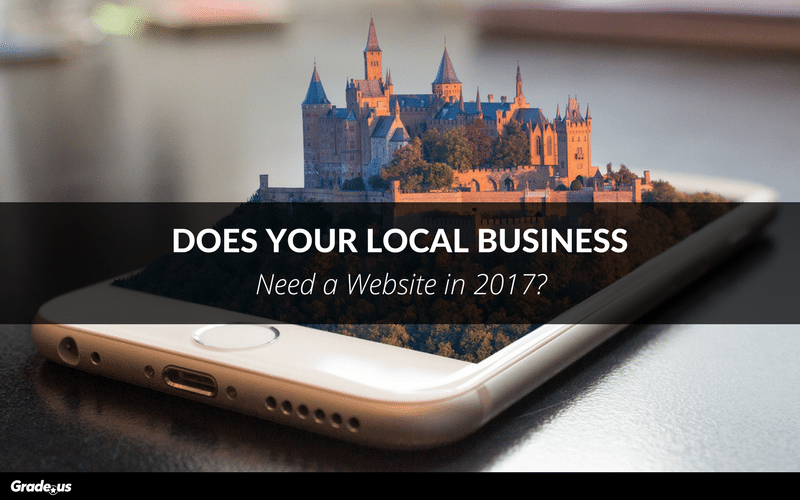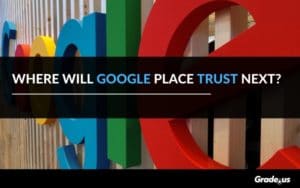Your website is dead…
A growing number of “experts” say it is. These experts suggest that websites, as they exist now, are obsolete and unnecessary. Some are more cautious, stating that a mobile friendly website is enough.
Are they right?
It’s 2017. Why do local businesses need websites? Aren’t general social networks (e.g. Facebook and Twitter) and specialized review sites (e.g. Zomato, ZocDoc, Avvo) enough?
Local businesses want it to be enough
Many don’t even want a website.
Wait, what?
That’s right. In 2016, almost half of U.S. small businesses did not have a website.
That makes sense.
It’s so much easier to rely on Facebook, Yelp and Google. It’s much easier to focus your time and attention on growing your business, right?
There’s a dangerous misconception lurking behind the scenes.
It’s the idea that websites are nothing more than brochureware. In fact, it’s common for local business owners to view websites as an unnecessary expense. Something that eats up precious time and resources.
This misconception is dangerous, because it’s true.
The vast majority of local businesses don’t see a major increase in business. That’s because most local websites are failing.
Local businesses don’t want a website
While there’s a slow increase of business owners with websites, there’s a significant portion of local businesses that rely on offline tactics.
But, is it working?
Research suggests that marketers are experiencing a case of diminishing returns. Traditional advertising is dying a slow death.
Without a website, local businesses die a slow death
Local businesses can use 3rd party websites, like Facebook, to give prospective customers the information they need to buy. But that’s the problem.
It’s a case of operating on “borrowed land.”
3rd party websites (e.g. social networks and review sites) allow you to use their products and services. These benefits come with a significant downside.
You have to play by their rules. Case in point?
IKEA.
In 2012 IKEA ran a contest on Facebook. They came up with an ingenious way to spread the word about a new store opening in Malmo, Sweden.
They wanted to attract the locals so they created a viral campaign. They played by the rules, keeping everything above board.
Take a look.
The results were amazing for IKEA.
Facebook wasn’t pleased.
Shortly thereafter, “viral campaigns” were outlawed. Users and brands weren’t allowed to run a campaign on Facebook unless they got a cut.
Your local business suffers the same fate
Facebook (and other social networks) changed their algorithm slowly over time, decreasing reach and impact. Brands that spent a significant amount of time and money on building a fanbase, were suddenly required to pay to speak to those fans.
Can you see the problem?
It’s a lack of control.
When you rely on a 3rd party you give them control over your local business. This dependency allows 3rd parties to decide what’s best for you. What does this typically mean for local businesses?
They’ll do what’s best for those they depend on, not your business.
A website gives you control.
Am I saying it’s a bad idea to use social networks, or review sites for your benefit?
No.
Can you rely on these sites to drive leads, customers and sales?
Absolutely!
But these sites should be subordinate to your website. All roads should lead back to your website.
Here’s why.
· Customers use it to evaluate you. They visit your website, looking for answers to objections, signals to gauge trustworthiness, signifiers that display appeal, class, viability, uniqueness and more.
· You can make (and keep) a promise. Working with a new business is risky. Your website gives you the ability to make a promise or commitment to customers, showing you stand behind your work. 3rd party providers may not allow that on their site.
· You can build a relationship with customers. Your website gives you the ability to do something significant. Ask for their contact info. You can use their email, address and phone number to build a relationship, something 3rd party providers will share for a fee.
· Analyze and evaluate your visitors. With conversion optimization tools and web analytics, you get the opportunity to test and evaluate your visitors.
If you’re an industry pro this is digital marketing 101. Which is precisely the problem. Local businesses aren’t getting this info, or if they get it, it’s positioned poorly.
If you’re a local business you need both…
You should be visible on Google, Facebook, Yelp – if your target audience is present you should be there.
But you also need a website.
Because all roads (should) lead back to you. Customers, wherever they are, however they find you, should find their way to your website. It’s an outlet where you have full control over your marketing presentation.
Just one problem.
Building a website takes time, money and expertise. It’s rare for a local business to have all three.
Is hiring a web development team worth it?
Absolutely.
Presentation isn’t just about looks. It’s a mix of tangible and intangible factors working together. A great web development team gets this intuitively.
Which produces more leads, customers and sales.
What if you can’t afford it?
Take the time to setup something via free / low cost providers like SquareSpace, Wix or WordPress. Here’s the thing about free / low cost services though.
They’re not really free.
If you want amazing results you’ll have to invest your time. Do what it takes to create something your target audience will find appealing. When it comes to the look and feel, be consistent.
A horrible website pushes you further from your goal.
Thanks to AI, websites are irrelevant
With automated web builders like Firedrop or The Grid, It’s easier than ever for local businesses to create an excellent website at a reasonable cost…
Just as long as you’re prepared to spend the time.
Ultimately though, why does it matter? Why is it so important that local businesses have a website?
Because your customers demand it.
Customers are skittish, they’re skeptical of new businesses. They’re ready to run at the first sign of trouble. A website relieves their doubts and soothes their fears. Local businesses without a website are viewed as a risk, a potential disaster in the making.
You know you’re not a disaster, but your customers don’t.
The experts are wrong, websites aren’t dead
Experts and pundits believe it is. They suggest that websites, as they exist now, are obsolete and unnecessary. We know they’re wrong, because customers tell us.
Customers continue to spend their time, their resources on websites.
They’re needed now, more than ever.
It’s 2017. Local businesses need websites. Social networks, specialized review sites – they aren’t enough. Customers want more from you.
Customers want validation, signals that show you’re trustworthy. 3rd party sources can help, but it all starts with you. Give customers what they need and they’ll reward you, spending far more time and money on your website than you expected.
Give customers what they want and they’ll show you websites aren’t dead.
About the Author
Andrew McDermott
Andrew McDermott is the co-founder of HooktoWin. He shows entrepreneurs how to attract and win new customers.










